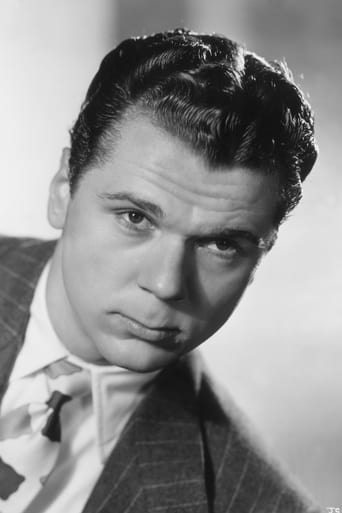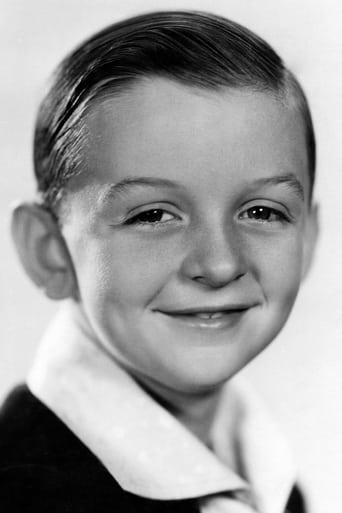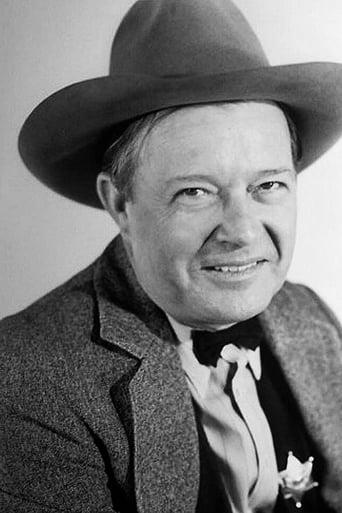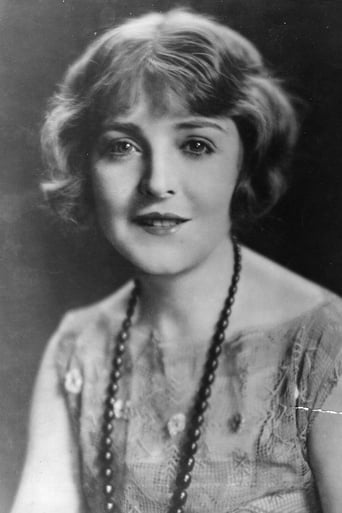TrueJoshNight
Truly Dreadful Film
Chirphymium
It's entirely possible that sending the audience out feeling lousy was intentional
KnotStronger
This is a must-see and one of the best documentaries - and films - of this year.
evanston_dad
I didn't expect much from "Skippy." How substantial could a Depression-era movie based on a comic strip be? But I found myself really into this film. I watched it with my kids and we all really enjoyed it.It's dated for sure, and the precocious antics of the child actors will likely grate on some. But I liked some of the cultural subtleties in this movie that I found parallels for in our current world. Like the hypocrisy found in Skippy's parents, affluent, casually prejudiced people who think poor, underprivileged folk are deserving of medical care (he's a doctor) but not of basic kindness and empathy (when Skippy wants to go to the "other side of the tracks" his mom asks him if he wants to grow up to be like "those" people). Or the tendency of Skippy's parents to underestimate the complexity of a child's world and who dismiss a child's problems because they're deemed less important than those of adults (not to a child, they're not). Jackie Cooper is the rare child actor, especially from that time period, who's able to be truly winning instead of aggravating. He received an Oscar nomination for Best Actor for his performance, I believe the youngest actor to ever achieve that feat. The film was also nominated for Outstanding Production and Best Writing (Adaptation), while Norman Taurog won that year's Oscar for Best Director. I've read that he got Jackie Cooper to cry at key moments in the film by threatening to shoot his dog. What a guy.Grade: A-
MARIO GAUCI
This constitutes one of the most surprising Oscar wins in history – the Best Direction nod for Taurog (reportedly, the youngest such recipient at the age of 32!) over heavyweights Lewis Milestone for THE FRONT PAGE (1931; who, by then i.e. the 4th ceremony, already had two statuettes to his name!) and Josef von Sternberg for MOROCCO (1930; the first of only two nominations for one of my dozen favourite auteurs!), both clearly superior films. Taurog was perhaps the epitome of the journeyman film- maker in Hollywood's Golden Age – showing a propensity for kiddie fare (such as SKIPPY and its unavailable inferior sequel made the same year, SOOKY, are), notably two BOYS' TOWN pictures (1938, for which he was also nominated, and 1941) and the Venice Film Festival winner(!) THE ADVENTURES OF TOM SAWYER (also 1938), and musical comedies (suffice it to say that he ended his career directing resistible vehicles for the likes of Jerry Lewis and Elvis Presley!). Incidentally, SKIPPY was also seminal for having the first child performer to be nominated for acting (nine year-old Jackie Cooper, who happened to be Taurog's own nephew!): needless to say, the role made him a star…yet lasted just a few years at the top (though he formed a durable partnership with Wallace Beery) – not least because the market was subsequently flooded by other talented juveniles (Shirley Temple, Freddie Bartholomew, Mickey Rooney, Deanna Durbin, Judy Garland, etc.). For the record, SKIPPY (which I had previously acquired a low-quality copy of, but did manage to upgrade some time back) was also nominated for Best Picture and Best Adapted Screenplay (co-written by Norman Z. McLeod and Joseph L. Mankiewicz – both better-known as directors, though the latter would only move up the scale 15 years down the line).Anyway, the film is a likable effort all round if hardly displaying outstanding merit at this juncture. Though a couple of them are overbearing (especially a girl with a penchant for yodeling!), the kids are practically the whole show here: apart from Cooper, easily the most effective is – the brother of famed child actor and later "Uncle Fester" incarnation Jackie – Robert Coogan (playing Sooky and actually top- billed during the opening credits, but rightfully listed below the protagonist when these are picked up at the coda!). Even cuter are the mongrels involved (which Sooky reasons are thus more "thoroughbred" than any pure breed!), around which the narrative partly revolves. The grown- ups are generally tyrannical (Skippy's health officer father – who intends demolishing the shantytown that is Sooky's home and to where his own boy frequently escapes), subservient (Cooper's mother) or just plain bullies (the local dog-catcher).The latter picks up Sooky's unlicensed dog, so he and Skippy scrape for money to pay for one and retrieve the mutt – even going so far as to do the old "puttin'-on-a-show" routine before a hostile audience of friends – but they are still too late to save it! Sooky is understandably crushed, and Skippy – indirectly blaming his dad for authorizing the putting-down of stray animals – withdraws to his room; in reparation, the father buys him a bike, which he immediately trades for a dog to give Sooky…but, upon meeting him, discovers his pal has already filled the void (albeit with a bulldog)! The film offers drama and sentimentality galore, but also a few undeniable comic highlights – particularly the accidental repeated smashing of the dog-catcher's car windshield (the second time round by Skippy's own father!).
kidboots
Percy Crosby's cartoon "Skippy", premiered in "Life" magazine in 1923 and became an instant success. It featured the doings of Skippy Skinner, a little boy living in the city, who was equally at home stealing apples, playing baseball or just trying to understand the world of adults. At one point, Crosby was earning over $2,000 a week - the strip was a phenomenal success and there were Skippy dolls, toys and comic books. Australia also had it's own version, "Fatty Finn", which was turned into a movie that is still fascinating with it's glimpses of Australian suburban life in the 20s. MGM found an ideal "Skippy" in Jackie Cooper (who claimed he only got the part because his uncle was the director). Regardless, he was perfect in the role and even looked like the character.Skippy would rather hang around in Shantytown "a beautiful place", much to the disgust of his father - a pompous doctor who is head of the local council. With his friend, snivelling Sidney - "say I can get away with murder at my place because I'm nervous and strung high", he makes the accquaintance of Sooky (Robert Coogan) a child so poor that even the Shantytown kids shun him. "Gee, it's elegant over here - alleys, goats and dumps". Skippy meets Sooky's mother (sad faced Helen Jerome Eddy) and Penny, his "thoroughbred" dog of mixed breeds. Their arch enemy is Harley Nubbins, whose father is the local dog catcher - of course the inevitable happens and Penny is caught. Skippy and Sooky then have to find a way to raise the $3 needed for a dog license. From selling old bottles, running errands to selling lemonade - nothing works, finally they decide to put on a show. Ordinarily things would end happily but in this movie, this is the time when you reach for the tissues. The movie ends on an extremely positive note and I really liked the way it explored the relationship between father and son, how the father sheds his stuffiness and comes to an understanding about his son and his problems and instantly goes about trying to help him.Robert Coogan was Jackie's little brother but, unfortunately, he didn't inherit the talent - even though he was very cute as Sooky. He made a follow up, "Sooky", in 1931 and a couple of others and then resurfaced in the 40s. Mitzi Green was mightily talented but you would have to seek out her other movies to see her at her best. In this one she was definitely a minor character, Skippy's neighbour Eloise, who recites poems at the drop of a hat ("Ode to a Dead Dog") and has theatrical ambitions. Jackie Searl had more to do as Sidney, Skippy's sidekick and did what he did best - playing an obnoxious little tattle tale. This is a beautiful little trip down memory lane to a time when children were allowed to be children.Highly Recommended.
lugonian
SKIPPY (Paramount, 1931), directed by Norman Taurog, which has nothing to do with a development of the peanut butter product, is a cute story based on the then popular comic strip character as portrayed by Jackie Cooper in a performance that earned this 10-year-old child actor an Academy Award nomination as Best Actor. Losing to one more than twice his age, Lionel Barrymore, for A FREE SOUL (MGM, 1931), SKIPPY did earn other nominations: Best Picture, Best Screenplay (Norman Taurog and Joseph L. Mankiewicz) and Best Director (Taurog, who won the honor that year).The story opens in a small wholesome town where the camera sets focus on the Skinner household. There's Herbert Skinner (Willard Robertson), a town physician, his wife, Ellen (Enid Bennett), and their little boy they call "Skippy" (Jackie Cooper). Getting ready for breakfast. Mr. Skinner calls for his son to get out of bed and dressed. As he is calling, the camera then pans upstairs into Skippy's bedroom where the boy is still in bed, pretending to be putting on his clothes lazily asking his parents downstairs which shirt to put on. After heading down for breakfast, Skippy is visited by the neighborhood kids, Sidney (Jackie Searle), an obnoxious tattle-taler, and his sister, Eloise (Mitzi Greene) who takes the time to recite a poem, "In Memory of a Dead Dog." Later, Skippy, who spends his free time in a "swell" district known as Shantytown, located on the opposite side of the tracks where poor people live, meets and befriends another boy called Sooky (Robert Coogan). At first Skippy wants to fight him, but when Sooky stands his ground, they become instant friends. Their day consists of innocent fun that lands them into trouble when they accidentally break the windshield of the mean Mr. Nubbins (Jack Clifford) car, whose profession is dog catcher. Later, Mr. Nubbins takes away Sooky's dog, Penny, for not having a license, placing the animal in the pound. Sooky is able to retrieve the dog, only if he comes up with a $3 fine for the license. With Skippy's help, they do, but Nubbins takes the money to replace his broken windshield, forcing the boys to come up with an additional $3 by 3 p.m. in order to get Penny, or else she'll have to "be destroyed." The boys attempt to get that extra cash first by getting some money from Skippy's piggy bank, collecting empty bottles, doing errands, selling lemonade and putting on a show for the neighborhood kids. While the boys successfully raise the money, the unexpected occurs. Skippy soon finds himself resenting his father, who not only warned him to stay away from Shantytown, but has looked down towards those the people whom Skippy finds to be just plain ordinary folks as he and his parents are, with the exception of having more money than they do. As with most family movies, and later TV sit-coms, there's a moral lesson here to be learned. In this instance, rather than the children, it's learned by the parents, particularly Skippy's.Featured in the supporting cast are Guy Oliver as "Dad" Burkey; Donald Haines as Harley Nubbins and Helen Jerome-Eddy as Sooky's widowed mother, among others. Eddy, a familiar face with sad expressions in many movies of the 1930s, is quite believable and natural as Sooky's struggling poor mother.SKIPPY is a cute, simple, funny and heartwarming story focusing solely on children, something quite rare for that time, with the exception of comedy shorts featuring Hal Roach's Our Gang (or The Little Rascals). To enjoy this sort of tale about the true loyalty and friendship between two boys is to really love and understand children. Movies such as SKIPPY could also be related by those who had grown up in such an bygone era. Director Norman Taurog presents the children, not just its stars, as normal every day innocent kids. SKIPPY could very well been set in any time frame, any location, whether during the Tom Sawyer era of the 1800s, or pre or post World War I. In other words, kids will always be kids.Aside from Jackie Cooper's fine performance, ranging from conniving, gentle and extremely tearful in that one climatic scene between him and his Dad, there is Robert ("Bobby") Coogan, the younger brother of Jackie Coogan, whose days as a top child star, which began in the early 1920s, were just about ending. Cute as he is natural, little Bobby Coogan comes very close in upstaging Cooper. So successful was SKIPPY, Paramount turned out an immediate sequel, SOOKY (1931) with the majority of the cast, minus Mitzi Green, reprising their roles.Unseen for many years, both SKIPPY and SOOKY were resurrected during the early years of cable television's U.S.A. cable network way past the midnight hours around 1987 before turning up again on Retroplex in August 2010, and Turner Classic Movies where it premiered February 22, 2011.Regardless of its age, SKIPPY is still timely, thanks to a literate script. For comedy, it delivers, For serious moments, it doesn't hold back. The crying scenes cannot actually be viewed without shedding at least one tear of emotion. As young as both Cooper and Coogan are, or were, they have presented themselves as real professional actors, or in better terms, common every day kids pretending to be somebody else, that as Skippy and Sooky. (****)



